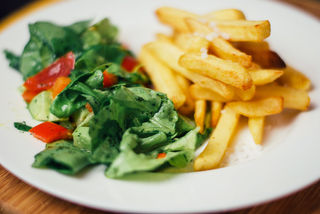Diet
When Calories Count
Calories always count, but you don’t have to count them.
Posted June 28, 2016

A movement away from calorie counting, or anything that reeks of a restricted weight loss diet, is smart when your goal is to develop intuitive eating habits, be more accepting your body type, or break a lifelong pattern of gaining and losing and gaining back even more. As an exclusive weight loss tool, counting calories doesn’t work for many people and can become an unhealthy obsession for others.
But calorie control—understanding calories, consuming fewer calories, and burning excess calories—is and always has been the cornerstone of weight loss and weight control. Ultimately, the difference in any weight loss approach compared to another (short of surgery) comes down to how we manipulate and track calories. You can’t just guess how many calories are in a measured amount of food because most people, especially people who are overweight, tend to underestimate.
What a Calorie Is (and Isn’t)
Increasing your nutritional literacy—how well you understand how your body uses food to supply energy and nutrients—includes understanding what calories are, what your body does with them, why some foods are higher in calories than others, and what that means when you are trying to lose weight or maintain a healthy weight. The most important thing to understand is that a calorie isn’t something that is actually in your food; it is a measure of the energy provide by a particular food. When you say there are a certain number of calories in a food, you are really saying that you will get a certain amount of energy from eating that food. Calories are neither friends nor enemies; they are not to be feared or revered. They simply allow us to compare the energy value of one food to another.
For some people, becoming aware of the approximate number of calories provided by different types of food is a helpful way to understand what you eat and how different amounts of food affect your weight. It is a tool like any other method or technique aimed at weight control and a goal of healthy eating. But calorie counting becomes a problem if you become obsessive about the number of calories you consume, or if it is the only thing you do to get to a healthy weight. And that’s because being healthy is about more than just weight
Healthy Portions
In lieu of calorie counting, you can measure portion sizes, but that requires pretty much the same amount of time and attention as calorie counting, and can potentially lead to the same type of obsession. Instead of dealing with numbers, you are dealing with size and amounts of foods; in order to learn about portion sizes, you will still have to learn or look up the recommended portion size for every type of food you eat. And, as with calories, you will have to stick to that portion size whenever you eat that food, no more and no less. It’s up to you. You can also forego any type of measurement at all and depend only on behavioral tools like mindful or intuitive eating but, on their own, these are not necessarily effective techniques for losing weight either.
The Bottom Line
In the end, whether it is called portion control, using standard serving sizes, collecting points, eyeballing your plate, measuring your food, or following a healthy meal plan, calorie regulation is still key to a healthy weight. If you’re not counting them, someone else is doing it for you when they make recommendations about portion sizes, servings sizes, or which foods you should or shouldn’t eat to get to or stay at a healthy weight. Even if your approach to weight control is to develop more intuitive eating habits and “honor your hunger,” you are essentially learning to consume just the amount of calories your body needs, no more and no less. You’ve just done away with the math.
It takes a combination of knowledge and technique to lose weight. You can learn to be more mindful in your eating habits and in other areas of your life, and at the same time, learn something about the calorie content of the food you eat. The bottom line is this: To achieve a goal of good nutritional health, it’s important to pay attention to the balance of your diet, or whether or not you are eating enough different types of foods to get the essential nutrients, disease-fighting phytochemicals, and fiber you need to stay healthy—and, one way or another, to try to eat a healthy amount of food—not too little and not too much. To be physically fit, it is just as important to get enough exercise as it is to eat the right foods in the right amounts. But first and foremost is remembering that your psychological health is as important as your physical health. No food or weight goal should ever cause extreme or ongoing stress, interfere with personal relationships, or make you sick.
References
Daubenmier J, Moran PJ, Kristeller J et al. Effects of a mindfulness-based weight loss intervention in adults with obestiy: a randomized clinical trial. Obesity. 9 March 2016; 24(4). http://onlinelibrary.wiley.com/doi/10.1002/oby.21396/full
Colaizzo0Anas T, Smith V, Tetewsky S, Wieczorek, WF. Energy-related nutrition literacy: weight loss energy intake targets, breakfast meny calories, and food portion sizes in women with elevated BMIs. Topics in Cinical Nutrition. March 2016;31(1):59-72.


